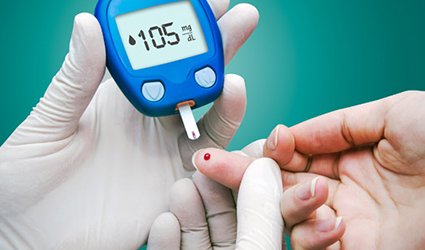New Biomarker to Prevent Severe Bouts of Low Blood Sugar in Diabetics
August 16, 2018
Source: EurekaAlert
 1,401
1,401

A new biomarker might possibly furnish new clues required to develop a diagnostic tool for hypoglycemia-associated autonomic failure (HAAF), an LSU Pennington Biomedical Research Center study found. There is no current objective diagnostic device for this life-threatening condition, if unchecked.
"There is currently no objective way for a health care provider to measure whether a patient has experienced repeated episodes of low blood sugar and therefore may be suffering from HAAF," said David McDougal, Ph.D., assistant professor-research and head of Pennington Biomedical's Neurobiology of Metabolic Dysfunction Laboratory.
Researchers at LSU Pennington Biomedical aimed to find ways via which biomedical imaging could present new solutions that enable measurement of occurrence of glucose level collapse. Instead of looking at glucose uptake in the directly in the brain, they focused on the adaptation of the brain after an incidence of crashed glucose levels.
The brain adapts by heightening the rate at which it utilizes other energy sources, like acetate, when glucose is not available.
"The results of our study suggest that this adaptation may still be present after exposure to times of low blood sugar and therefore can be used to measure how frequently a person experiences low blood sugar," McDougal said. "We believe that by measuring how well a person's brain uses acetate, we might one day be able to determine if they are suffering from HAAF or are at increased risk for developing the condition in the near future."
This would enable doctors to offer treatment for decreasing this risk by altering the medication the person is on or recommending the use of a glucose monitoring device, McDougal said.
He remarks that "more studies will have to be conducted in order to demonstrate if this biomarker can be of practical clinical use." He has applied for a provisional patent for his breakthrough.
By DduRead more on
- Things to Know before Buying Newborn Baby Incubators March 31, 2022
- Bayer’s Kerendia approved in the US to slow CKD in type 2 diabetes patients August 26, 2021
- Autoantibody order, timing predict genetically at-risk children most likely to get type 1 diabetes October 30, 2020
- Highly Resistant Food Poisoning Bug Responds to Antibiotics September 6, 2018
- Smartphone Based Diagnosis to Identify Mosquitoes Transmitting Infection September 5, 2018
your submission has already been received.
OK
Subscribe
Please enter a valid Email address!
Submit
The most relevant industry news & insight will be sent to you every two weeks.



